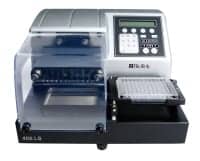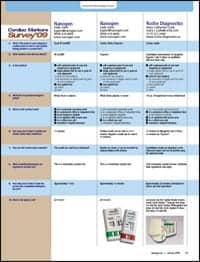
The test, which runs on the Access Immunoassay System, improves results consistency. Its patented technology quantifies bone metabolism by measuring bone-specific alkaline phosphatase (BAP), which reflects on bone metabolism. The assay detects BAP changes within three to six months, compared with one or two years for bone densitometry. It also is less expensive than a densitometry test.
Compared with urine tests, this assay has lower variability because it eliminates concern about time of specimen collection, diurnal and biological variability. Assay results are available in 30 minutes. The monoclonal assay provides long-term, lot-to-lot consistency. Inter- and intra-assay reproducibility make it easy to compare results. Instrument and assay calibration is stable for up to 28 days.
Beckman Coulter
Keyword: assay, osteoporosis, Paget’s disease



